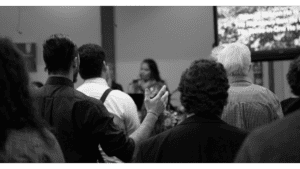In this sermon, based on 1 Corinthians 8:1–13 and Mark 1:21–28, our pastor, Rev. Ian Forest-Jones, reminded us local churches are not clubs where everyone has ‘it all together’. We are sinners saved by grace who build each other up to maturity. Sometimes we succeed, but mostly we learn together by processing together God’s story and our own stories, learning how to make sense of them that we might find meaning and purpose, make sense of our experiences, and together find guidance for our actions and our beliefs.
This sermon was delivered on Sunday, 28 January 2024.
During my formative years as a young Christian, an alt-pop singer/songwriter by the name of Steve Taylor released a song on his album with the confronting title, “It’s Harder To Believe Than Not To”. And, honestly, he was not kidding. I have discovered this to be true in my pastoral AND my personal experience.
Being a friend of Jesus involves not just recognising the truth of God’s existence and the truth of his commands but continuing to live as if they are true in every situation and challenge we face.
As we prepare to restart our regular ministry programs and occasional events for this year, it is important we are sure we understand how our individual discipleship interacts with our community of faith. In other words, God’s story making sense of our story happens necessarily in community. Therefore, placing our faith in Jesus requires a commitment to building each other up to maturity.
The fact is we will not commit to placing our faith in Jesus, living a Christian lifestyle, nor building each other up to maturity unless we actually believe God’s commands are true. It is this simple fact I want us now to consider seriously.
Stories Are Naturally Helpful to the Human Condition
Last week I presented to you a definition of discipleship: The friends of Jesus place our faith in him, live a Christian lifestyle, and build each other up to maturity. In expanding on the first segment of this definition, which describes the act of placing one’s faith in Jesus, I have chosen to use the language of story —you may have noticed that last week. You may then have wondered why? I would like to explain it to you more fully now.
I use the language of stories because stories are naturally helpful to the human condition.
Journalist and storytelling expert Christopher Booker wrote about the ubiquity of stories in our daily experience by explaining,

We spend a phenomenal amount of our lives following stories; telling them; listening to them; reading them; watching them being acted out on the television screen or in films or on a stage. They are far and away one of the most important features of our everyday existence … These structured sequences of imagery are in fact the most natural way we know to describe almost anything which happens in our lives.[1]
Think of the last time you tried to make a point or share a piece of information. How often did you share that recommendation or insight in the form of a story?
Think about how much you enjoy stories more than the dry and direct transmission of information, no matter how useful that information is —I am trying to avoid a dry and direct transmission right now.

In his book, “The 16 Undeniable Laws of Communication”, John Maxwell explained what storytelling does for us:
- Stories animate our reasoning process
- Stories create emotional responses
- Stories are pictures of who we aspire to be
- Stories give us permission to act
- Stories connect
- Stories stick
- Stories captivate us
- Stories are us[2]
This week, my son described to our family a recent trend in social media of posts describing “dad lore”.

In May last year (2022), Tumblr user propalitet made a post that read, “fathers casually dropping the craziest lore of their lives in the middle of a conversation”, which was followed by Tumblr user revolutionarytea writing, “My brother and I trying to piece together our dad’s life based on random info he casually brings up once and then never mentions again.” The post gathered over 180,000 responses in a year.[3]
My favourite story from the original thread was shared by user legendofthehiddenbbc:
My grandmother was harassing me about the dangers of online dating, and my grandpa was like, “oh fer crying out loud, leave her alone. My parents met online, she’ll be fine.” Apparently my great grandparents were both telegraph operators who would chat over the line in between messages and fell in love and my great grandma moved halfway across the country to marry a dude she met over the telegraph.
No one alive in the family had ever heard this story until like 70+ years later when I happened to start seeing a dude from OK Cupid [an online dating service].
It is my guess the impulse of fathers to drop these stories into random conversations is to communicate how the current situation they are in reflects something of who he is as a person now or the person he used to be but has now grown out of.
Even more interesting, according to my son, is that young men are now identifying their crazy behaviour as ‘building up their dad lore’, like one user who chose cartoon images from the series Invincible to depict how he planned to share his ‘dad lore’ with his son:[4]

Our Creator, in his goodness and generosity, designed us to respond to and interact with each other best through stories, making stories naturally helpful to the human condition. In fact, the Bible itself contains a significant amount of stories. It is estimated 40% to 45% of the Bible is narrative material. This includes stories of creation, historical accounts, parables, and biographical narratives of various individuals. The stories in the Bible serve different purposes, such as conveying moral lessons, recording historical events, and illustrating spiritual truths.
Stories are naturally helpful to the human condition, which makes our life together much more interesting.
God’s Story Provides a Foundation for Our Life Together
From our own personal experience, we know some stories are better than others. They are more interesting and they explain more.
Of all the stories that have ever been told or will be told, it is God’s story alone that provides an overarching story that serves as a solid foundation for our life together.

While it has always been the case, especially in our postmodern world, many argue we do not need a grand, overarching story —called a “metanarrative”— to make sense of our story.
Metanarratives presume to provide a framework for understanding and interpreting the world. Religious texts, philosophical theories, and cultural ideologies aim to explain the meaning and purpose of life, as well as the major events and themes that shape human existence. But in our postmodern world the individual can do that for themselves, thank you very much.
But can we? Really?

Josh McDowell, author of the now-classic apologetic book, “Evidence That Demands a Verdict”, used a very simple technique for demonstrating just how much we need God’s story to make sense of ours. McDowell would start by asking someone, “Are you a good person?”
To which they would normally answer, “Yes, of course, I am.”
He would then ask, “How do you know you are a good person?”
They might respond, “I do good things” or “I have good values”.
McDowell would then ask, “How do you know those things or values are good? If you decide for yourself what is good, then you can call anything ‘good’, can’t you? That wouldn’t make it so.”
The person might then retort, “Society tells me what is good”, to which McDowell might then ask, “But if you, an individual, are incapable of determining what really qualifies as ‘good’, how can a dictatorship (with one person making the decisions) or even a democracy (with a collective of individuals making the decisions) be any better at determining what is ‘good’ than you are?”
The person might then declaring in exasperation, “I just know in my heart what is good.”
McDowell will then bring his point home by stating, “But that sense of knowing what is good must be based on something other than yourself or society. Where then does it come from?” To which the only satisfactory answer is, “the God who made the world and everything in it —he is Lord of heaven and earth … in him we live and move and have our being” (Ac 17:24, 28; cf. Jer 17:9).
If we were to be honest with ourselves, we know deep within that we do not naturally know what is right or wrong, what is good or bad, what we should or should not do. Even so, we all have a sense there is a standard for right or wrong, good or bad, and that standard comes from beyond us. We stretch and we strain to understand and follow that standard or we try ever so desperately to find our own way in the world.
In that search, the dry and direct transmission of wisdom and guidance does not capture our imagination but stories do move us.
The stories contained in the Bible reveal God’s story as a grand, overarching story that can help individuals and societies make sense of their experiences and guide their actions and beliefs. It alone provides a solid foundation for our life together.
When we discover and accept that truth, we just know how right that truth is.
“All Truth Is Relative!” Is Untenable
“But we have been told all truth is relative!” our family, friends, and neighbours decry.
“Well, how is that working out for you?” we really should ask more often.
Our postmodern world wants all truth to be relative to each individual, which is untenable. That way of viewing the world is not able to be maintained or defended against attack or objection. A simple illustration designed by Brett Kunkle of the apologetics organisation Stand To Reason will make this clear.

On the count of three, I want you to shout out your favourite flavour of ice cream…
When it comes to choosing a flavour of ice cream, you choose what you like or what is true [of your preferences]. There is no “right” flavour you must choose and no one is going to take issue if you like chocolate more than vanilla [although, statistically, vanilla is the most popular flavour around the world].
However, when it comes to choosing medicine you do not choose what you like or what is true for you. Rather, you choose the right kind of medicine, medicine that will actually heal you —medicine that is true … period.
On the count of three, I want you to shout out what is the correct medicine one should take if he is a diabetic…
A diabetic who is prescribed insulin does not say to his doctor, “I don’t really like the hassles of injecting insulin. I think I’ll choose a medication that I like better and is more convenient.” Why? Because a medical prescription is objectively true. It is not dependent on one’s tastes or preferences. (emphasis original)[5]
To say a truth is objective does not mean that everyone agrees, or that you know it for certain. It only means that it is capable of being true or false. If you are working on a complex mathematics problem, you may not be certain you have the right answer but you are certain there is a right answer, not merely your personal preference.
Your preferences or opinion are what we call subjective. Your favourite flavour of ice cream is your choice. You can prefer chocolate or you can prefer vanilla or, if you are a ‘true blue’, ‘fair dinkum Aussie’, then you will prefer Fairy Bread ice cream from Gelato Messina, which includes buttery toast flavoured gelato with hundreds and thousands sprinkled throughout.
Let’s put this distinction between objective and subjective truth to the test. I will ask you all a couple of questions and I want you to shout out “Insulin” if you think my statement is objective —being true or false, right or wrong— or shout out “ice cream” if my statement is subjective —being a personal preference:
- “That guy/girl’s shirt is red.” Insulin/Objective.
- “Movieworld is better than Seaworld.” Ice cream/Subjective.
- “2 + 2 = 4.” Insulin/Objective.
- “Coffee is better than tea.” Ice cream/Subjective.
- “Speeding is wrong.” While some would like to think Ice cream/Subjective, the answer is Insulin/Objective because it is the law of the land, even though that also makes it subjective because the lawmakers are individuals.
- “Sex outside of marriage is wrong.” Insulin/Objective. Despite our often overwhelming temptations, the biblical instructions are very clear.
- “God exists.” Insulin/Objective, if Jesus is who he said he is and what is written about him is true.
Sadly, far too many people —yes, among your family, friends, and neighbours— cannot distinguish between right and wrong, what is true and what is false. They want to believe all truth is relative, but this way of viewing the world fails ‘the pub test’, yet so many people fall for it.
Let’s be honest. You need to take a hard look at yourself and ask whether you know the difference?
There is a difference between right and wrong, objective and subjective truth. While we would prefer ice cream to insulin, not everything can be subjective. Truth is not relative to my whims nor fancies. At some point, there needs to be things of which I can be certain, which are true or false no matter my opinion of them.
The existence of truth, rather than opinion, means finding meaning and purpose to life is possible, we can make sense of our experiences, and we can find guidance for our actions and our beliefs.
To say “truth is relative” is very fashionable, for it is an attractive way of viewing the world, but it is untenable. It does not stand to reason. Not everything can bend to your opinion or preference.
There is a better way.
We Process Stories Better Together
Believing all truth is relative makes the world all about you and that is, ultimately, very lonely. You will avoid every situation or person who does not agree with nor conform to your personal preferences until you are all by yourself. And that is no way to live.
Since it is true stories help us to make sense of human existence, it is also true we process stories better together —especially God’s story and our own story.

Sharing stories is a fundamental human activity serving various purposes, from entertainment to education, cultural preservation to fostering empathy. One compelling illustration of the power of story-sharing is the use of personal narratives in support groups, such as Alcoholics Anonymous (AA).
In these settings, individuals share their personal journeys of struggle and recovery. This storytelling acts as a source of inspiration and support for others who are facing similar challenges. It helps members feel less alone, understand others have faced and overcome similar obstacles, and helps members learn strategies for dealing with their own issues.
Moreover, sharing stories in such contexts can foster a strong sense of community and belonging, which is crucial for emotional support and can significantly aid in the recovery process. It is a vivid example of how storytelling can be an instrumental part of human growth and healing.

Local churches are not dissimilar to support groups based on the Twelve Steps framework, a framework which was first designed by Bill Wilson and Dr. Bob Smith, the founders of Alcoholics Anonymous in 1938. Both Wilson and Smith were themselves Christians inspired and informed by their faith. They discovered sharing each other’s stories of struggle with alcoholism was pivotal in their recovery.
Because they are similar to support groups, local churches are not clubs where everyone has ‘it all together’. We are sinners saved by grace who build each other up to maturity. Sometimes we succeed in life, but mostly we learn together by processing together God’s story and our own stories, learning how to make sense of them that we might find meaning and purpose, make sense of our experiences, and together find guidance for our actions and our beliefs.
An Example from the Bible
In our reading from The First Epistle to the Corinthians we find an excellent example of this processing.
Now about food sacrificed to idols: We know that “we all have knowledge.” Knowledge puffs up, but love builds up. (1 Corinthians 8:1)[6]
In this scripture focus, Paul the apostle reminded the friends of Jesus at Corinth of what they believed to be true, “that … knowledge puffs up, but love [being affection and goodwill and benevolence toward each other] builds up” (1 Cor 8:1b). Remembering this truth together helped them to apply it to the question of whether to eat food sacrificed to idols or not?
The issue of whether the friends of Jesus are permitted to eat food sacrificed to pagan idols has a lot of nuance to it but no ‘hard and fast’ rule. So, essentially, Paul wrote, “Judge for yourselves … If anyone wants to argue about this, we have no other custom, nor do the churches of God” (1 Cor 11:13–16). The friends of Jesus are free to have our own opinion and preference on this issue.
However, there is an objective truth that overrides the subjective truth of our preference or opinion on this issue and most other issues:
But be careful that this right of yours in no way becomes a stumbling block to the weak. (1 Corinthians 8:9)
Say what?! Did Paul write that we should let other people’s opinions guide our own behaviour? Yes, if our behaviour is a stumbling block to a brother or sister-in-faith and causes them to sin.
Therefore, if food causes my brother or sister to fall, I will never again eat meat, so that I won’t cause my brother or sister to fall. (1 Corinthians 8:13)
The apostle encouraged, nay instructed, the community of the friends of Jesus at Corinth to forego purchasing and eating meat sacrificed to pagan idols if there are those among their community of faith whose conscience would be hurt by this choice.
While this instruction was not written to us, it is certainly written for us —it comes up even in our day when we eat Halal meat. Contemporary friends of Jesus are to consider seriously how our behaviour affects others in our community, whether our freedoms cause the less mature to stumble, or even bring the commands of God into disrepute.
This is a value that is quite contrary to the spirit of this world. We will need to work out together how to apply this timeless wisdom and discern together what behaviours to refrain from in these uncertain times.
That is the purpose of our Connect groups, to reflect together on the timeless wisdom revealed in the Bible and discern together how and when to apply these timeless truths. This is how we build each other up to maturity. Sometimes we succeed but mostly we learn.
We will only to commit to this practice of learning together if we too agree with the crowds at Capernaum who
were astonished at Jesus’ teaching because he was teaching them as one who had authority (Mark 1:22)
Conclusion
So what do you think? What does you conscience tell you? Does God exist? It is written in The Letter to the Hebrews,
Now without faith it is impossible to please God, since the one who draws near to him must believe that he exists and that he rewards those who seek him. (Hebrews 11:6)
If you accept the objective truth of God’s existence, then you must believe the objective truth Jesus is who he said he is and that what is written about him is true! Let me remind you of C.S. Lewis’ faith, of which he wrote,
I believe in Christianity as I believe that the Sun has risen not only because I see it but because by it I see everything else. (C.S. Lewis, “Is Theology Poetry?”)
What do the friend of Jesus know to be objectively true? God is faithful; Jesus saves; the Holy Spirit empowers; and, the Church will endure. By these, and other truths revealed in the Bible, we see everything else.
To be a friend of Jesus is to conform your life to Jesus’ teaching because we believe God’s commands are true. It is to view and judge all of your life and all of the human condition and all of the systems of this world against the objective truth of the testimony of the Bible, especially as it reveals God’s commands.
Commit to walking in them, to the best of your ability and in the power and leading of the Holy Spirit. For those commands you do not understand, or for those teachings you struggle to obey, there is a community of brothers and sisters-by-faith who are willing to connect with you and mature with you. Sometimes we will succeed in this, but mostly we will learn when we admit to each other our shortcomings and failures, and allow the Holy Spirit to show us and equip us in a better way of being human.
Let us now and together commit to placing our faith in Jesus, living a Christian lifestyle, and building each other up to maturity because we actually believe God’s commands are true.
[1]Christopher Booker, The Seven Basic Plots: Why We Tell Stories (New York, NY, USA: Continuum, 2004), pg. 2.
[2]John C. Maxwell, The 16 Undeniable Laws of Communication: Apply Them and Make the Most of Your Message, Kindle Edition (Maxwell Leadership, 2023), pg. 212.
[3]“Dad Lore”, Know Your Meme website, https://replug.link/7531b8b0 (accessed 27-Jan-2024).
[4]See https://replug.link/7531b8b0 (accessed 27-Jan-2024).
[5]Brett Kunkle, “Stand To Reason: Moments of truth” newsletter, Stand To Reason, May 2005 (Signal Hill, CA, USA).
[6]Unless otherwise noted, all scripture quotations are taken from The Christian Standard Bible (Nashville, TN, USA: Holman Bible Publishers, 2017).
Leave a Reply